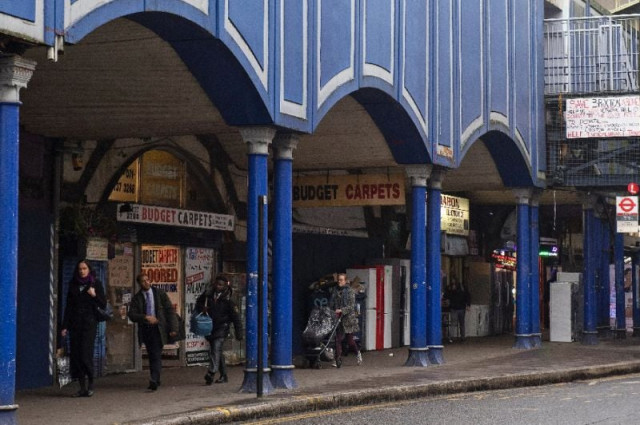Battle of Brixton: gentrification splits famous London district
Currently populated with a diverse range of shops, was home to Caribbean migrants settled from the 1940s

Locals in the south London neighbourhood of Brixton are fighting a new wave of gentrification they fear will sanitise its vibrant streets and destroy livelihoods. PHOTO: AFP
Parts of the area were once considered no-go zones because of the drug trade - a far cry from its current status as one of the British capital's hippest districts, with streets transformed over the years. But such is the scale of change that locals say they are being forced out by rising prices.
A commercial refurbishment by Britain's rail operator of several viaduct arches running through the heart of Brixton has become the focus of people's anger.
"They want to clean us out," says Malek Menad, a textile merchant who is among the tenants who believe Network Rail's plans are an attempt to cash in at his and other traders' expense.
Currently populated with a diverse range of shops, the viaducts are in the same area where many Caribbean migrants settled from the 1940s onwards.
London named best city in the world for quality of life
Network Rail has started to refurbish the units on Atlantic Road and Brixton Station Road, on either side of the railway, with around 20 independent stalls and eateries being boarded up since October.
Menad is one of four traders under the arches refusing to close their doors.
Locals dispute Network Rail's claim that 75 percent of tenants plan to return following the works and an online petition is backing the rebel shopkeepers. "The majority won't come back" says Ray Murphy, a 26-year-old carpet shop boss who opposes the redevelopment.
The overhaul has a financial motive, according to Jah Weatherman, a white-bearded Jamaican who runs a small shop under the viaduct selling Rastafari flags and Bob Marley T-shirts, "They're doing some refurbishment to get higher rents and put McDonald's and Burger King here," he says.
Rents for businesses under the viaduct will more than double by 2022, according to a document published by Network Rail, and the rebel merchants are threatening to bring the case to court. They point to the higher compensation offered to those agreeing to leave permanently as another sign that Network Rail wants to eject the traditional traders, some of whom have operated there for 40 years.
Fishmonger LS Mash & Sons, founded in 1941, shut up shop in August.
The boarded-up premises until recently featured a banner that read, part in jest and part in despair: "Triple the rents? You must be squidding!"
Another shop on Atlantic Road, the Continental grocery store, closed a few months earlier.
The only two major retailers within the renovation project, bookmaker William Hill and H & T Pawnbrokers, signed deals allowing them to stay open and avoid building works, infuriating the independent traders.
"We haven't been offered the same leases," says Menad, adding that the local council of Lambeth backed Network Rail "100 percent".
"If Network Rail get extra rents, the council will get extra rates," he adds, referring to local tax paid by businesses.
I'm not a Muslim leader, says London mayor
The clean-up of the area and its location only 15 minutes by subway from central London attracts younger, upwardly mobile residents seeking comparatively lower rents and affordable homes.
The covered market was once defined as "the commercial and social heart of the extensive Afro-Caribbean community that settled in Brixton after World War II" when it was listed as a heritage site.
But it is now a hipster haven. Afro-Caribbean grocery stores and hairdressers comprise only a third of remaining shops, rubbing shoulders with a gluten-free restaurant, a champagne bar and a vegan cupcake seller.
"Brixton has become the new go-to-place, but the indigenous of this area - not just blacks - have literally been ousted," says Elbee Brown, a resident and employee of the neighbourhood's Black Cultural Archives. "It's ethnic cleansing. Those people have come here to make money. They haven't come to mix."
Rocketing property prices and the changing nature of vendors represent a threat to long-term residents, says shopkeeper Murphy. "Most people here can't afford a burger that costs £10 ($12, 12 euros)," he adds.



















COMMENTS
Comments are moderated and generally will be posted if they are on-topic and not abusive.
For more information, please see our Comments FAQ